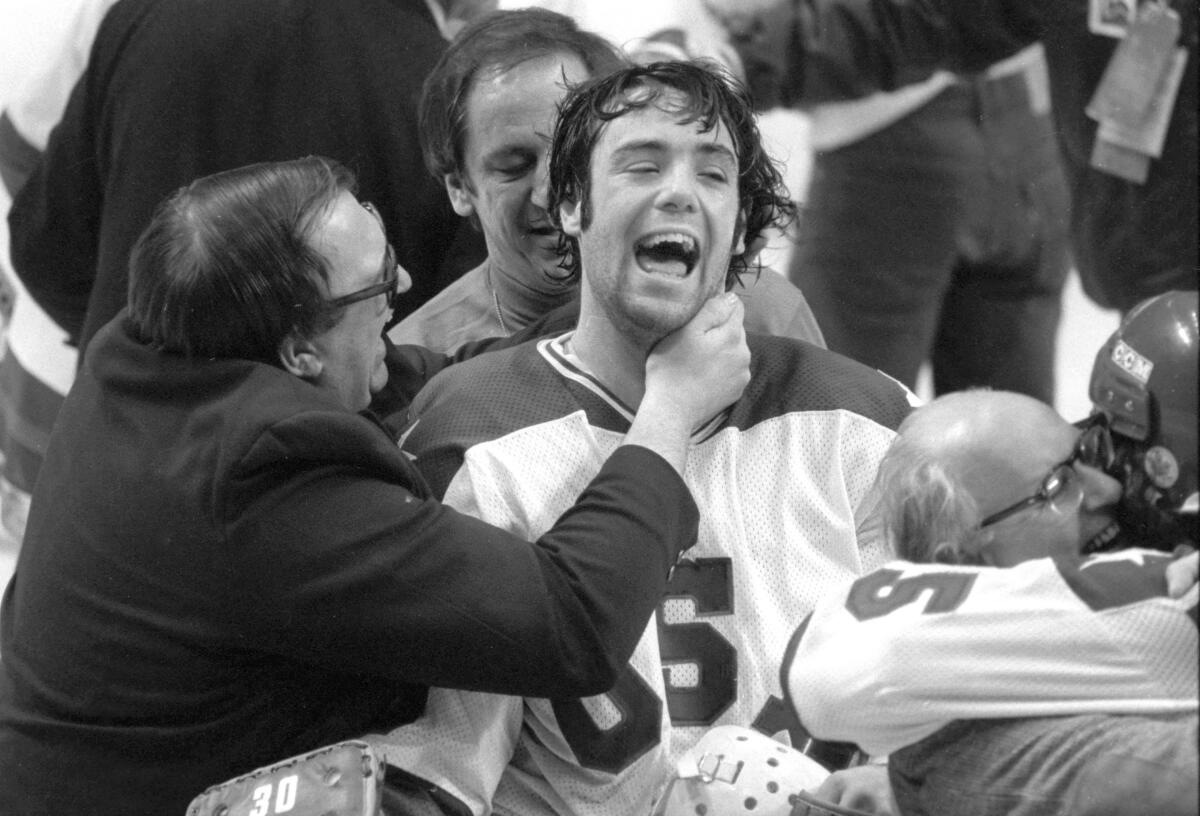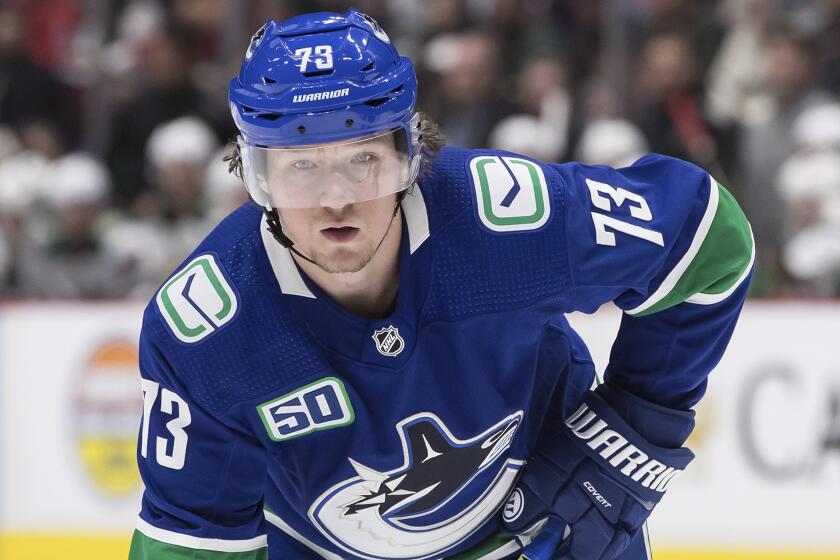Column: Forty years later, ‘Miracle on Ice’ still has a lot of meaning to players and fans

- Share via
LAS VEGAS — The stories always flow when members of the 1980 U.S Olympic hockey team gather for one occasion or another, but the beauty of it is that the flow also goes between the storytellers and their audience. That’s why a hockey tournament that took place 40 years ago in the isolated mountain town of Lake Placid, N.Y., has enough meaning to be remembered 40 years from now and beyond.
Each time a player describes the moment coach Herb Brooks warned them they’d take it to their graves if they didn’t follow up their upset of the mighty Soviets with a gold-medal victory over Finland in the finale, someone will approach that player — sometimes in gratitude and often in awe — to share memories of where they were when the Americans used their legs and their hearts to overcome the skillful Soviets and then heeded Brooks’ words and won that gold medal.
“They want you to know,” forward John Harrington said Saturday, the 40th anniversary of the “Miracle on Ice” upset of the Soviets. “I was walking down the street today, and two people came up with USA stuff on and told me, ‘Hey, my whole basement is Miracle stuff, and can I take a picture with you?’”
Each time a player explains how Brooks quashed the college rivalries between the Minnesota and Massachusetts guys by uniting them in annoyance at his hard-driving tactics, listeners eagerly share the impressions they formed of Brooks from TV or from watching actor Kurt Russell’s dead-on portrayal in the 2004 film “Miracle.” They’ll ask whether Brooks was really that mean. Players say they sometimes didn’t like him but always respected him.
Washington Capitals star Alex Ovechkin becomes only the eighth player in NHL history to score 700 or more goals.
“I think around five, 10 years, we started talking about the fact that this isn’t going to last. And then it just continued on. It really does amaze us,” said David Christian, whose father Bill and uncle Roger played on the lesser-known 1960 gold-medal U.S. team. “The movie brought it to another generation. We’ve become accustomed in the last few years to hearing, ‘I wasn’t born then, but I heard my parents talk about it. My grandparents shared their story.’”
There’s a strong emotional connection between the team and those who revere them for having used their youth, talent and American ingenuity to turn the impossible on its red-helmeted ear. The thread crosses generations, genders and team allegiances and it was reinforced this weekend in Las Vegas, where the Golden Knights hosted the 1980 team members and their families for anniversary celebrations that were as lavishly over the top as the city itself. If Las Vegas was an unlikely site for a tribute, it was also a perfect choice because the passionate reception that fans in this desert city gave to champions of an ice-bound sport reaffirmed the enduring depth of the team’s impact.
At an event for Golden Knights season-ticket holders Friday at the Brooklyn Bowl, fans in USA jerseys pressed up to the stage in an adoring mosh pit. Players and assistant coach Craig Patrick were introduced in a pregame ceremony Saturday at T-Mobile Arena, where full-throated chants of “USA!” broke out. In a nice nod to history, American Max Pacioretty took the ceremonial faceoff for Vegas against Florida’s Aleksander Barkov, whose parents are Russian. Vegas forward Gage Quinney became the first Nevada-born player to appear in an NHL game, further opening the door the 1980 team had cracked open.
“It’s 40 years later, and it’s crazy,” Harrington said, “but it’s something that touched a lot of people whether they were hockey fans or not hockey fans.”
The 2004 film ‘Miracle’ didn’t follow the script when it came to most hockey movies. It provided a dramatic retelling of one of the greatest Olympic moments.
They never tire of being asked for photos and autographs or being thanked for what they did. “It’s just amazing that it’s resonated for 40 years,” forward Buzz Schneider said. “We were just out there to play hockey, to play the best teams in the world and do well.”
There was no internet or social media or pervasive TV coverage then to tell them their success had taken on Cold War political overtones. The only hint they had caught the world’s attention came in the form of telegrams that were posted on the wall outside the locker room. They since have come to appreciate that their hockey success has become a life lesson.
“I just met a lady from Vancouver whose son got killed at the Vegas concert shooting [in 2017]. And she had a picture of her son and the Canadian flag, and she talked about the Olympics and what it meant. I was almost crying,” said team captain Mike Eruzione, who scored the winner in the 4-3 upset of the Soviets.
“Over the 40 years, I’ve heard some incredible stories. We didn’t know. We touched the lives of so many people, for whatever reason it was. I think we take great pride in that. It’s not too much of a responsibility. We just enjoy the comfort and joy we bring. Everybody’s got a smile on their face. Everybody’s got a story to tell. I’ve had people come up to me and start crying because that moment meant something to them, for whatever reason it might have been.”
For many who admire the team, the game against the Soviets triggers poignant memories of now-lost loved ones who sat beside them, or of how the Olympians’ triumph inspired them to overcome their own adversity. “They watched the game with their mother, grandfather, aunt, uncle,” Eruzione said, “or they’re Vietnam veterans and the games brought joy back to their life. We embrace it. We should embrace it because here we are in Vegas with thousands of people here that feel a part of our team.”
Tyler Toffoli, Alec Martinez and Kyle Clifford, who all won two Stanley Cups with the Kings, and Ondrej Kase from the Ducks were among veterans traded.
When they’re together for celebrations like this or for fantasy camps in the same Lake Placid rink where they beat the Soviets and Eruzione beckoned his teammates to join him on the medal stand after they won the gold medal two days later, they easily slip back into old nicknames and habits. “We’ve celebrated, I think we started around 10 years and right on up through to 40,” said defenseman Ken Morrow, who easily transitioned from the Olympics to the NHL and helped the New York Islanders win four straight Stanley Cup championships. “It’s like we’re back in our locker room when we see each other.”
Yet, Morrow said, there are still some surprises after 40 years. “You continue to learn new things you didn’t know,” he said. “Craig Patrick will tell a story about Herb that you never heard before, so that’s a lot of fun. It’s always a lot of fun when we get together.”
Forever captured on film and in photographs as young and fresh-faced, it’s startling to see that their hair is sparser or greyer or both. Mike Ramsey was the youngest player, at 19. He’s now 59. Eruzione and Schneider are 65. The group that assembled in Las Vegas this weekend was the largest they’ve had in quite a while, but time has taken a sad toll. Steady defenseman Bob Suter died of a heart attack in 2014, and Brooks died in a single-car accident in 2003. Brooks was represented here this weekend by his daughter, Kelly Brooks Paradise, and granddaughter Olivia Paradise.
Kings forward Martin Frk signs a two-year contract with the team as he continues to cement his place on the roster.
Also missing was gifted center Mark Pavelich. The center on the “Iron Rangers” line with Schneider and Harrington, Pavelich was committed to a secure state facility in Minnesota after he was accused of assaulting a neighbor in August. Pavelich’s family believes he has mental issues related to concussions he suffered as a player, but he has resisted treatment. His teammates are trying to support him, but his issues are complicated.
Otherwise, life generally has been kind to them. Ramsey, Christian, Neal Broten, Rob McClanahan, Jack O’Callahan and clever center Mark Johnson had solid NHL careers. Patrick won the Stanley Cup twice as general manager of the Penguins and built the core of Pittsburgh’s 2009 Cup team. Bill Baker, whose tying goal against Sweden in round-robin play made the rest of the miracle possible, recently retired after 25 years as an oral and maxillofacial surgeon in Minnesota. Morrow is the Islanders’ director of pro scouting. Johnson coaches the University of Wisconsin’s women’s hockey team and led the 2010 U.S. women’s Olympic team to a silver medal. Steve Christoff became a pilot. Others became bankers or work in the financial industry; Harrington coaches the Minnesota State women’s team. They’ve become fathers and, in many cases, grandfathers.
Will there be a 50th reunion? “That would be fabulous if we’re still around,” Christian said, smiling. “We won’t be moving quite as fast. We move slow now, but we’ll be even slower in 10 more years.”
That won’t matter. Their story and its meaning will never grow old.
More to Read
Go beyond the scoreboard
Get the latest on L.A.'s teams in the daily Sports Report newsletter.
You may occasionally receive promotional content from the Los Angeles Times.








